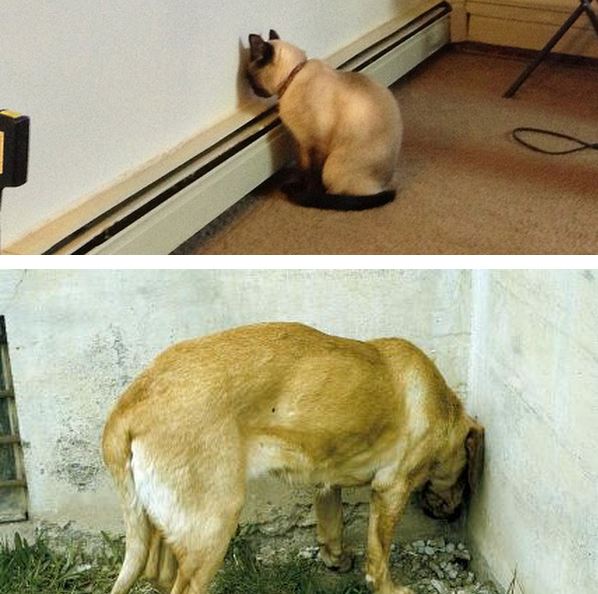Recently, there was an article sweeping the internet about “head pressing.” Although rare, it is something to watch for, especially if your dog suffers from one of the conditions that can cause head pressing.
We spoke with Dr. Kim Smyth, staff veterinarian and pet health writer at Petplan Pet Insurance to get some more in-depth answers to our questions.

What Exactly is “Head-Pressing”?
The term “head pressing” is actually pretty descriptive—the affected pet stands close to a wall or other hard surface (furniture, the corner, etc) and literally presses the top of her head against it. It almost always signifies significant illness.
What are the illness/diseases that can cause this behavior?
Many diseases can have head pressing as a clinical sign, but most often we associate it with hepatic encephalopathy, a condition that occurs in pets with liver disease. The liver is meant to remove toxins from the blood stream. When it doesn’t function properly, ammonia and other toxins build up and create this neurologic syndrome of head pressing.
Many breeds are predisposed to liver shunts, a condition in which blood bypasses the liver. Head pressing is a common clinical sign in these pups because of the hepatic encephalopathy that occurs secondary to the liver shunt.
Other conditions that can cause head pressing are:
- Hydrocephalus (water on the brain)
- Tumors in the brain
- Strokes or vascular accidents in the brain
- Head trauma.
- Inflammatory and infectious types of meningitis and encephalitis
- Any kind of trauma to the head or brain can potentially cause head pressing.
Are these disease and illness hereditary?
Some diseases, like liver shunts and hydrocephalus ARE hereditary. Pets with these conditions should not be bred. The other causes mentioned are not hereditary.
Any other symptoms people should look for?
Depending on the underlying cause for head pressing, other symptoms will likely be apparent. In the case of the most common presentation (hepatic encephalopathy), owners will likely see signs of liver disease including:
- Jaundice (yellowing of the whites of the eyes and gums)
- Weight loss
- Increased urination
- Increased water intake
- Lethargy
- Mental dullness (particularly after a meal)
Are there any Preventions?
Not specifically. Many of the conditions that lead to head pressing are just luck of the draw. By keeping your pet healthy, up to date on vaccines, and on appropriate external and internal parasite control, you can avoid some of the infectious causes of encephalitis, however.
What is the prognosis of an animal that displays this behavior? Does waiting to seek treatment make a difference?
Prognosis largely depends on the underlying cause. There are treatments for many of the conditions that lead to head pressing, and often pets can make a full recovery.
For most veterinary illnesses, the sooner treatment is sought, the better. When pets come to us already weak and dehydrated from several days or weeks of illness, we are behind the 8 ball before we even begin.
How quickly could this turn deadly?
Again, this is highly variable depending on the underlying cause. If you see your pet displaying head pressing, he or she should be seen by a veterinarian the same day.

Any other information readers need to know?
You should not be concerned if your pet rubs his or her head against you for affection or attention. This kind of head butting is completely different from head pressing, which is an obvious effort to press the head into firm stationary objects.
(H/T: Reshareworthy.com)
 Toledo, United States.
Toledo, United States.